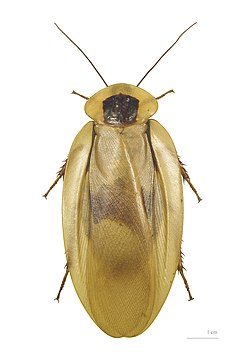Cockroach
The cockroach is an insect of the suborder Blattaria of the order Blattodea. There are 4,000 species. About 30 species invade human homes. This is less than 1% of all the cockroach species. Four species are pests.



Evolutionary history and relationships
changeThe families of Mantodea, Isoptera, and Blattaria are usually combined by entomologists into a larger group called Dictyoptera. Current evidence strongly suggests that termites have evolved directly from true cockroaches, and many authors now consider termites to be in the family of cockroaches.[1][2][3]
Historically, the name Blattaria has been used largely interchangeably with the name Blattodea. Blattodea refers to a larger group that includes fossil groups related to roaches, but not true cockroaches themselves.[4] These earliest cockroach-like fossils ("Blattopterans" or "roachids") are from the Carboniferous period between 354–295 million years ago. However, these fossils differ from modern cockroaches in having long ovipositors and are the ancestors of mantis as well as modern cockroaches. The first fossils of modern cockroaches with internal ovipositors appear in the Lower Cretaceous. A proposed phylogeny of the families is shown in the diagram.[5]
|
Cockroaches in the broader sense (Blattodea) have existed a very long time. The earliest cockroach fossils are 354–295 million years old. Science student, Cary Easterday, found a giant 300 million year old fossil cockroach 9 cm (4 in) long, in a coal mine in Ohio.[6]
Other
changeMost cockroaches are omnivores. They are tough, and hard to kill. A cockroach can live for two weeks without a head.[7][8]
Cockroaches become adults in 3-4 months and can live up to one year. A female German cockroach can produce 8 egg cases in her lifetime and each egg case may contain 30-40 eggs.
Cockroaches are eaten as snacks and used for medicine in China.
In popular culture
changeThe 1996 MTV musical movie Joe's Apartment had 5,000 singing cockroaches. Some parts of the movie were made with clay roaches and some with real roaches.[9]
In the 1996 computer game Bad Mojo, the main character is turned into a cockroach and must move through a building to get back to his human body.[10][11][12]
References
change- ↑ "Termites are 'social cockroaches'". BBC News. 13 April 2007. Retrieved 5 February 2011.
- ↑ Eggleton P. et al. 2007. Biological Letters, June 7, cited in Science News 171 p318
- ↑ "Termites are cockroaches after all - Natural History Museum". nhm.ac.uk. 2011. Archived from the original on 8 January 2011. Retrieved 5 February 2011.
- ↑ Grimaldi D 1997. A fossil mantis (Insecta: Mantoidea) in Cretaceous amber of New Jersey, with coments on early history of Dictyoptera. American Museum Novitates 3204: 1-11
- ↑ Maekawa K.; Matsumoto T. (21 January 2004). "Molecular phylogeny of cockroaches (Blattaria) based on mitochondrial COII gene sequences". Systematic Entomology. 25 (4): 511–519. doi:10.1046/j.1365-3113.2000.00128.x. S2CID 84666265.
- ↑ "News in Science - Mega cockroach - 08/11/2001". www.abc.net.au. Retrieved 2009-02-21.
- ↑ "NATURE. Critter Guide. Cockroach. | PBS". pbs.org. 2011. Archived from the original on 23 September 2011. Retrieved 5 February 2011.
- ↑ "Fact or Fiction?: A Cockroach Can Live without Its Head: Scientific American". scientificamerican.com. 2011. Retrieved 6 February 2011.
- ↑ Roger Ebert (August 2, 1996). "Joe's Apartment". RogerEbert.com. Retrieved September 1, 2020.
- ↑ Richard Cobbett (March 14, 2015). "Saturday Crapshoot: Bad Mojo". PC Gamer. Retrieved August 29, 2020.
- ↑ "Bad Mojo". Metacritic. Retrieved August 29, 2020.
- ↑ Dennis Michael (March 22, 1996). "A computer game for roach wannabes". CNN. Archived from the original on February 25, 2021. Retrieved August 31, 2020.